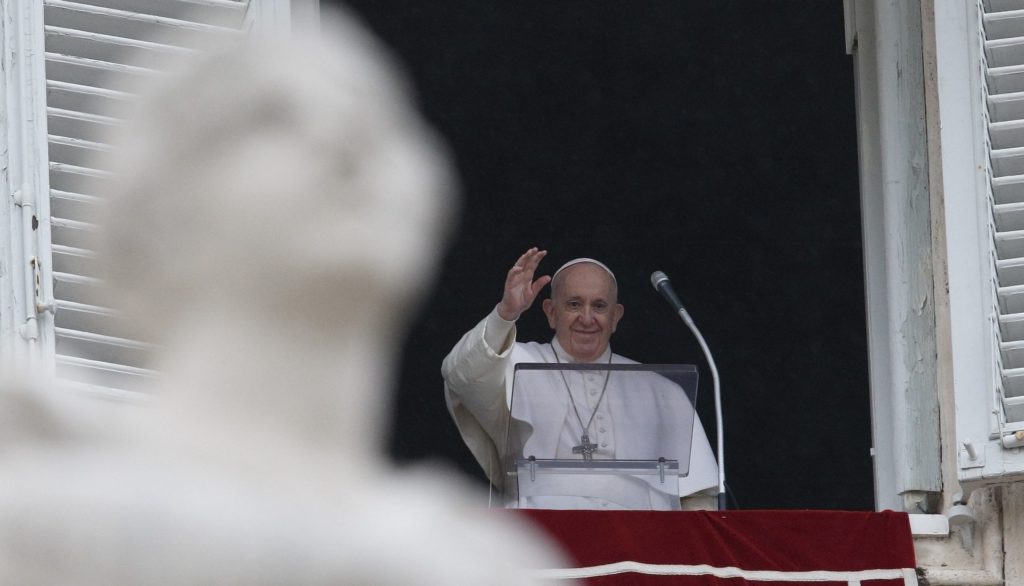 "He who prays is like a lover, he carries in his heart the beloved person".
"He who prays is like a lover, he carries in his heart the beloved person". Pope's Audience: "Mass is not simply listened to; it is celebrated and lived".
Pope's Audience: "Mass is not simply listened to; it is celebrated and lived".Pope Francis prayed the traditional Angelus this Sunday morning, February 14, from the window of the Apostolic Palace of the Vatican in the presence of some of the faithful gathered in St. Peter's Square. During the last few weeks, the Holy Father had celebrated his Sunday Angelus from the library of the Apostolic Palace, due to the health measures caused by the pandemic.
Social exclusion
The Pope reflected on today's Gospel passage that recounts the encounter between Jesus and a man suffering from leprosy. Francis recalled that at that time, "lepers were considered impure and, according to the prescriptions of the Law, had to stay out of inhabited places.".
"They were excluded from all human, social and religious relationships. Jesus, on the other hand, allowed the man to approach him, was moved, and even reached out and touched him."Francis pointed out, underlining that in this way, the Son of God puts into practice the Good News that he announces.
God has become close to our lives, has compassion for the fate of wounded humanity and comes to break down every barrier that prevents us from living our relationship with him, with others and with ourselves.
On the other hand, the Pope pointed out that in this episode we can observe that there are two actions that attract attention: on the one hand there is the leper who dares to approach Jesus and on the other, Jesus himself who, moved by compassion, touches him in order to cure him.
In Jesus he saw another face of God: not the God who punishes, but the Father of compassion and love, who frees us from sin and never excludes us from his mercy.
Breaking out of isolation
The leper's action stands out because "despite the prescriptions of the Law, he comes out of isolation and approaches Jesus. His illness was considered a divine punishment, but in Jesus he was able to see another face of God: not the God who punishes, but the Father of compassion and love, who frees us from sin and never excludes us from his mercy".
In the same vein, the Pope wanted to emphasize that that man "He can come out of his isolation, because in Jesus he finds God who shares his pain. Jesus' attitude attracts him, pushes him to come out of himself and to entrust his story of pain to him.".
To touch with love means to establish a relationship, to enter into communion, to involve oneself in the life of the other to the point of sharing even his or her wounds.
On the other hand, Jesus also acts in a way that scandalizes, because "while the Law forbade touching lepers, He is moved, He stretches out His hand and touches him to cure him. He does not limit himself to words, but touches him. To touch with love means to establish a relationship, to enter into communion, to involve oneself in the life of the other to the point of sharing even his wounds."
Safety distance
For the Pope, this gesture of Jesus shows that God is not indifferent, that he does not maintain a "safe distance"; on the contrary, "he draws near with compassion and touches our life in order to heal it".
Jesus approaches us with compassion and touches our lives to heal them.
Before concluding his address from the window of St. Peter's Square, Francis recalled that even today, throughout the world, there are so many brothers and sisters suffering from leprosy, "or other diseases and conditions with which, unfortunately, social prejudices are associated." and en some cases there is even religious discrimination.
God comes in contact with the sick
In the face of the different and very varied circumstances that may arise in the course of our lives, "Jesus announces to us that God is not an idea or an abstract doctrine, but the One who is "contaminated" with our wounded humanity and who is not afraid to come into contact with our wounds", warning us against the risk of silencing our pain by "wearing masks", in order to "comply with the rules of good reputation and social customs", or directly giving in to our selfishness and inner fears so as not to "involve ourselves too much in the suffering of others".
Before concluding, the Pope invited the faithful to ask the Lord for the grace to live these two "transgressions" of the Gospel: "That of the leper, so that we have the courage to come out of our isolation and, instead of staying there to lament or cry over our failures, we go to Jesus just as we are. And then the transgression of Jesus: a love that makes us go beyond conventions, that makes us overcome prejudices and the fear of mixing with the life of the other".
Finally, he recalled that Wednesday marks the beginning of Lent, a time of conversion and prayer, ideal for growing in friendship with God, living with hope, faith and charity.











